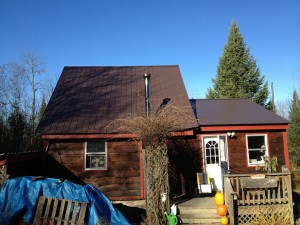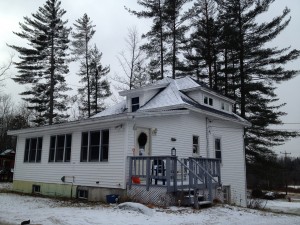Melissa Elander, J. Myers Builders, Inc.
New Hampshire homeowners may qualify for a 50% incentive, up to $4,000, to help pay for energy efficiency improvements including lighting upgrades, water conservation measures, air sealing, and insulation through the Home Performance with Energy Star program. Homeowners can find out more about the Home Performance with Energy Star program by going to www.nhsaves/save-home/, or by contacting their utility company.
J. Myers Builders, Inc., an insulating company in Lisbon, NH, has been a contractor for the Home Performance with Energy Star program since 2009. Working with the utility companies, they help reduce energy use with audits, improvements, and rebates. Here are two examples:

Rebates totalling $1,758.94 will save the owners of this home in Lyman, NH $718.31 annually.
Jacob and Michelle own a home in Lyman, NH. The home is post-and-pier construction and is heated by a kerosene furnace and a wood stove. Jacob and Michelle enrolled in the Home Performance with Energy Star program through Public Service Company of New Hampshire.
During the initial energy audit, the blower door test in the 1,190 square foot home measured 5,541 cubic feet per minute (CFM50) of air flow. After air sealing and insulation improvements were completed, the final blower door test measured 3,800 CFM50. This is a substantial reduction in uncontrolled air leakage and heat loss in the home.
The floor of the home was under-insulated and was a large source of air infiltration. The floor was air-sealed using spray foam and insulated with dense-pack fiberglass insulation. On the interior of the home, a crawl space at the eaves had spray foam insulation installed on the underside of the roof, to insulate and prevent heat loss at the soffits. According to Jacob and Michelle, “we could tell the difference in the heating after the first day, before the crew was even finished! I think the biggest difference was the insulation under the house, specifically under the bathroom, and that attic space.”
In addition to insulation in the floor system and crawl space, a low-flow showerhead was installed, six CFL light bulbs, hot-water-pipe insulation, a CO monitor and a dryer vent. With a rebate of $200, an inefficient refrigerator was replaced with an ENERGY STAR, reducing consumption from 1401 kwh/year to 652 kwh/year. “The audit was thorough and clearly explained. The best part is that they explained all the things we could do to improve the efficiency of our home, and what each renovation would entail. We were then allowed to pick and choose those improvements we felt would be best for us and also coincide with our budget.”
The total project cost was $4,465.06, reduced to $1,758.94 by the rebates available through the
Home Performance with Energy Star program. The projected annual savings are one cord of wood, 77 gallons of kerosene, and 1395 kWh of electricity. This is also projected to reduce carbon dioxide emissions by 3,581 pounds per year and save the Jacob and Michelle $718.31 annually.

Energy efficiency improvements made possible through financing incorporated into Kelly Smith’s monthly electric bill are projected to save her 521 gallons of propane annually. Photos: Melissa Elander
Kelly Smith of Lancaster, NH, enrolled her home in the Home Performance with Energy Star program through Public Service of New Hampshire. The home is heated by a propane furnace and propane fireplace. The home was very cold and electric space heaters were used to supplement the forced-hot-air heat.
J. Myers Builders, Inc. insulated the exterior walls of the home using dense-pack cellulose, as well as the floor of an overhanging floor system. The band joist (sill area) and concrete foundation walls were air sealed and insulated with spray foam insulation. A large chase in the attic that was a significant cause of heat loss was air-sealed and additional insulation was added in the attic.
The original blower door test measured 3,763 CFM50 for the 1,962 square foot home. After insulation was added and air sealing was completed in the basement, attic and around interior trim board, the final blower door measured 2,314 CFM50. The insulation work was completed in February and Kelly immediately noticed that the house felt warmer.
The showerheads were replaced with low-flow showerheads and six CFL bulbs were installed. A digital thermostat, which can more accurately detect the temperature of the room, was installed to replace the dial thermostat. The total project cost was $5,087.04, reduced to $2,085.78 by rebates. Kelly applied for the 0% interest financing through PSNH, which breaks down the $2,085.78 into monthly payments that are incorporated into her monthly electric bill. The insulation improvements are projected to save Kelly 521 gallons of propane annually, and reduce carbon dioxide emissions by 6,809 pounds.








Leave a Reply